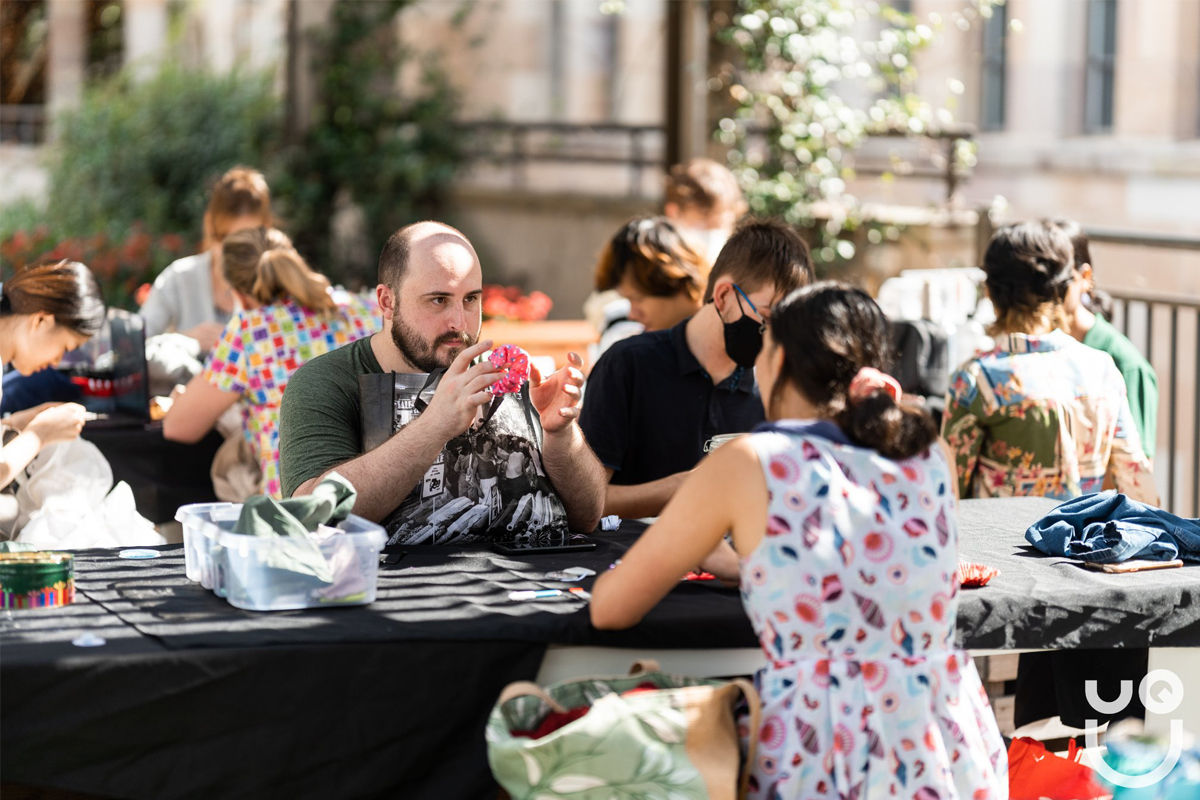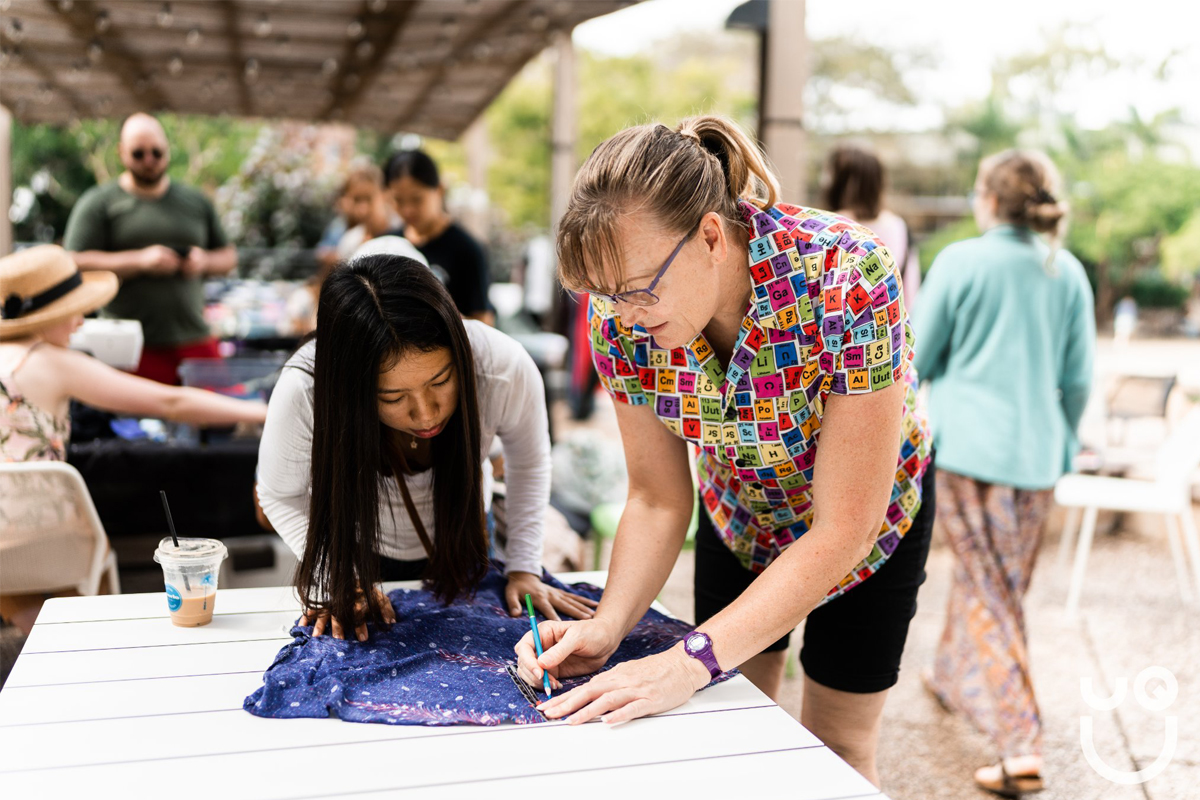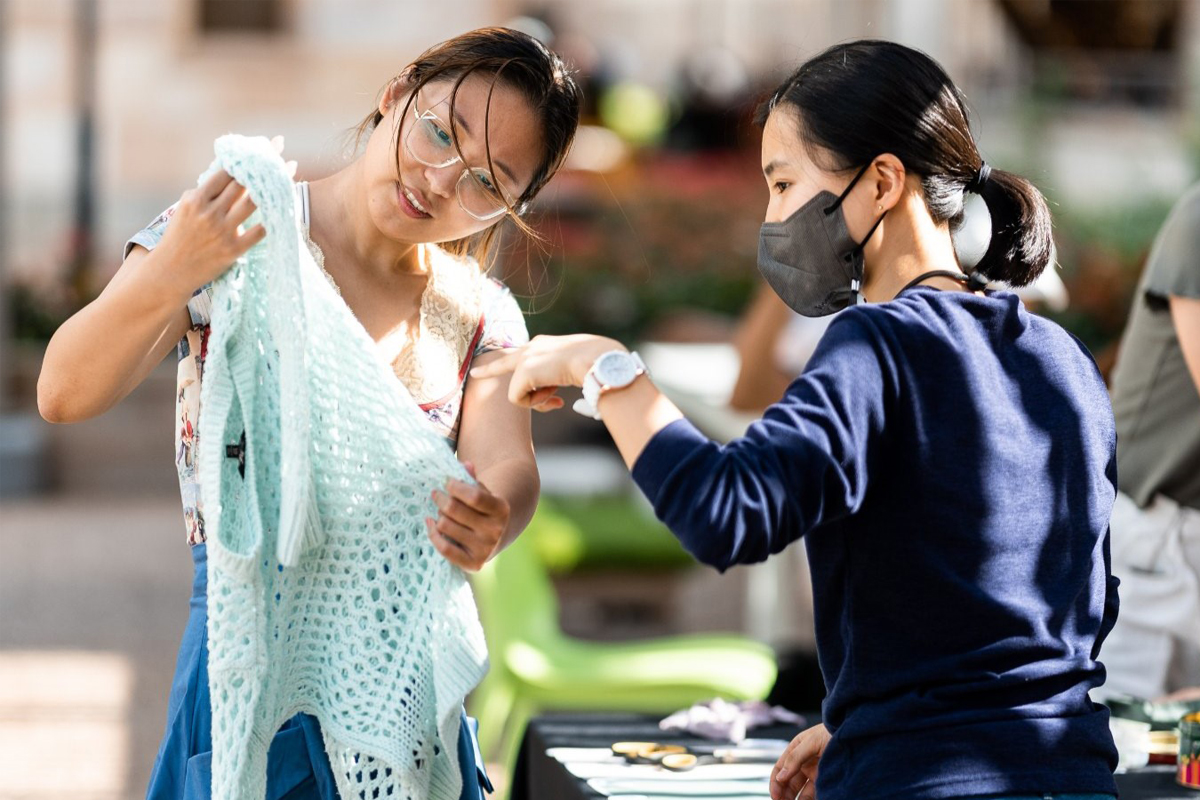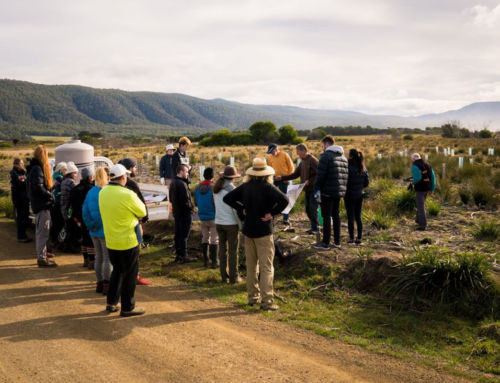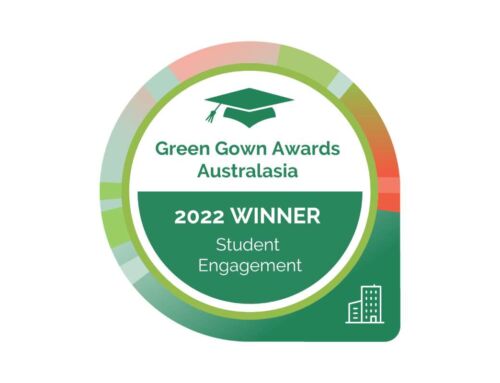UQ Repair Café brings circular economy to life
Saving more than 200 items from landfill, and upskilling more than 90 repair volunteers to date, the UQ Repair Café is a thriving sustainability initiative that cultivates mindful consumption, community connection and communal learning – all while participants enjoy a cup of tea and a chat.
Launched just under two years ago, the Repair Café hosts regular events where students and staff bring along a variety of broken items to be fixed. The initiative is run in partnership with the UQ student chapter of Engineers Without Borders; UQ Innovate (an on-campus maker space facility); and the UQ Sustainability office.
The Repair Café elevates circular economy principles out of sustainability theory and into a real-life learning environment. Covid supply chain issues have strengthened a local desire for self-reliance and waste reduction, and these events enable students and staff to gain practical skills that foster long-term reuse and recycling behavioural change.
> The initiative
Since launching in 2020, the UQ Repair Café has welcomed more than 160 attendees across ten events. Nearly 200 individual items have been repaired. Two more events are planned for the second half of this year, and attendance is increasing at each event, as reputation grows and pandemic restrictions ease. For each event, students and staff are invited to bring along their broken items and watch as they are mended, also learning new skills themselves. Repairs are separated into three main categories: handheld items requiring sewing repairs (e.g. bags, clothing, canvas); handheld household items requiring mechanical repairs (e.g. bikes); and handheld household items requiring carpentry or general repairs (e.g. small furniture items).
While the initiative is run in a partnership by the UQ student chapter of Engineers Without Borders, UQ Innovate and the UQ Sustainability office, the events themselves call upon a host of additional student and staff volunteers to contribute expertise, from sewing to technical repairs. An informal apprentice system operates, whereby ‘apprentice fixers’ shadow ‘specialist instructors’ to gain hands-on experience, from trouble-shooting to practical fixing. When attendees arrive at a Repair Café event, they are matched with an apprentice fixer who, with the oversight of a specialist instructor, examines the item, diagnoses the problem and offers advice before proceeding with the repair. In a friendly, social setting, the volunteer repairers engage with attendees throughout the repair process so they can also gain new skills. In the case of an item being damaged or broken beyond repair, the repairers will discuss the options, which may include recycling or guidance on its safe disposal.
This format delivers benefits to all participating groups:
- Attendees: Firstly, attendees often regain full use of their object, which can be a beloved or sentimental item they are loathed to part with. Secondly, they learn skills to potentially undertake their own repairs in the future – and to better judge the quality of new items next time they are purchasing
- Volunteer repairers: The expertise traded between apprentice fixers and specialist instructors create a valuable relationship of knowledge sharing and mentoring. Repairers also attend an orientation and training session before an event, through which they gain a deeper understanding of reuse and recycling principles
- Coordinating students: Leadership, event management, promotion, communication, and workplace health and safety are among the disciplines and skill areas in which coordinating students gain experience. Accessing support and guidance from staff in the UQ Sustainability and UQ Innovate offices, the coordinating students also grow their professional networks
- Everyone: Everyone benefits from the community aspect of Repair Café. Drinks and low-key snacks are provided at each event to encourage a relaxed and social atmosphere. Technology is also used to create ongoing connections, with a dedicated UQ Repair Café social media group (now sitting at 135 members) “allowing us all to continue interacting with a friendly community who care about sustainability”, as described by one participant.
Further supported by the international non-profit, the Repair Café Foundation, the UQ Repair Café taps into a national and international community of committed reuse and recycling volunteers, giving our students exposure to diverse sustainability approaches, ideas and networks that can form the foundations of their later career and lifestyle directions.
> Environmental and social benefits
As a behavioural change driver, the UQ Repair Café can create significant flow-on environmental benefits. For example, repairs to clothing items are by far the most repairs the Repair Café performs. The United Nations Environment Programme (UNEP) has conducted lifecycle assessments on clothing items, which show it takes 3,781 litres of water to make one pair of jeans. The process equates to around 33.4kg of carbon equivalent emitted*. Using the UNEP figures, if 100 items of repaired clothing each year prevent the need for 100 new items to be purchased (and, by eventual extension) manufactured, the UQ Repair Café has helped to save up to 378,000 litres of water and reduced the need for up to 3,340kg of additional carbon equivalent to be emitted. So, the UQ Repair Café plays an important role in increasing reuse. It also encourages respect for resources and reduces unsustainable consumption.
The UQ Repair Café also provides data to RepairMonitor, which is an online citizen science tool affiliated with the international Repair Café Foundation. The tool is used by Repair Cafés around the world to share data about all sorts of repairs attempted. The data is used by the foundation to gain insight into the durability of items in our daily lives and informs their circular economy advocacy positions.
The format of the UQ Repair Café has created a strong sense of community. This is fostered at physical events and in between events via a dedicated Facebook group, set up and run by the Engineers Without Borders student coordinators. Many volunteers and attendees return from one event to the next. Having students lead this initiative has meant Repair Café events are promoted enthusiastically among the student networks, using social media groups, word-of-mouth and university clubs. Through staff collaboration and connections, UQ communication channels such as all-staff emails are also used. This has delivered Repair Café events that are socially inclusive and diverse. We have volunteers and visitors of all ages and backgrounds, from first-year students to UQ professors. Because the Repair Café focuses on fixing physical items, face-to-face interaction is integral to the initiative. Our events in 2022 are playing an important role in bringing students and staff back to campus after two years of pandemic interruption to social connections.
*United Nations Environment Programme, What’s in your jeans?.
> Leadership and engagement
- Our implementation of the Repair Café in a tertiary institution context is unique in Australia and rare globally
- Our three-way partnership sets us up to deliver the initiative over the long term through a collaborative model
- Our Repair Café has saved more than 200 items from landfill and shared skills among more than 250 volunteers and attendees
- The opportunity to create lasting behavioural change and modify patterns of consumption is meaningful.
As our 2022 UQ Repair Café student coordinator, Pabine Gotame, says: “The UQ Repair Café is special in that it not only encourages students to fix their broken items, it also teaches them how to do it for next time. I believe this is very important for university students, as it allows them to learn repairing skills that can be essential on a student budget, but which they can also use throughout their life.”
Professor Salit Kark, from the School of Biological Sciences, brought along several clothing items to the most recent event. She says: “I attended the most recent café with a pile of old clothes that needed repair. The volunteers were outstanding and included both experienced and new repairers. The student volunteers came from many disciplines, future engineers, arts, science students and more. Not only did they help fix my old, much-loved clothes, but they also inspired me to find and repair more items on my own at home!”
> Significance to the sector
UQ is the only university in Australia that we know of to run a student-run Repair Café – and one of very few around the world. Of the 57 initiatives currently operating nationally, most are run by community-based groups*. Using their own creativity and ingenuity, the UQ Repair Café student crew have created a format that suits students and the university environment. They have tapped into their student networks to promote and grow the program organically, and they have created a lovely student community feel at the events. We would love to see more tertiary institutions running their own Repair Cafés, as we believe the habits, principles and skills nurtured through this initiative can create long-lasting positive patterns of consumption and sustainable behaviour. We aim to act as a learning leader in this space, and gaining recognition for the UQ Repair Café through the Green Gown Awards would allow us to increase our ability to share ideas and amplify the exposure of the Repair Café concept in the higher education sector.
> Wider societal impact
The UQ Repair Café delivers three main benefits – all of which, independently, create wider societal impacts. One of the most valuable elements of the Repair Café, however, is the way it integrates benefits into a single initiative that’s easy and free for people to access. From a wider societal perspective, first and foremost, the UQ Repair Café reduces waste. When our repair volunteers fix items, those items are saved from landfill. When people bring an item to be repaired it promotes sustainable patterns of consumption and cultivates reuse and recycling behaviours. Secondly, the UQ Repair Café provides a space for communal learning, which also fosters community connection. As the world emerges from two years of pandemic lockdowns and isolation, rebuilding the community is a priority. Our events bring together people from different cultural groups, and demographics and with varying repair abilities – necessarily attending in-person to carry out repairs on physical items and enjoy a cup of tea while they are at it. Thirdly, the UQ Repair Café builds capacity in repair expertise. As Covid has caused supply chain breakdowns and product shortages, it has also highlighted the importance of domestic capability. On a national level, this has translated into a renewed focus on Australian manufacturing.
On an individual level, this has seen many more people seek out avenues for reuse and repurposing. The UQ Repair Café provides a timely service to help people meet their own sustainable living goals. As our 2021 Repair Cafe Coordinator, Sanjay Saxena, says: “I think the right and ability to repair is a fundamental factor in creating a more sustainable society. The UQ Repair Café provides an easy way for our student and staff community to have their common clothes and items repaired – and sometimes we can even turn flaws into fashionable features through patchwork and more! We’re helping to build a more sustainable society, and we’re having a good time while we do it.”
> Learner/Graduate employer impact
Students who volunteer to help coordinate the UQ Repair Café gain skills including leadership, teamwork, organisation, marketing and promotion, communication, event management, and exposure to workplace health and safety and insurance. Because of the nature of the student-staff partnership, the students also gain invaluable experience working alongside professional roles. They receive guidance as they plan events, complete post-event reporting and implement strategies to grow the program. Students who volunteer as repairers have the opportunity to either pass on their expertise, building their own mentorship and leadership capability, or learn new practical skills and problem-solving techniques that can be widely applied outside of the Repair Café context.
The 2022 UQ Repair Café student coordinator, Pabine Gotame, says of her time in the leadership role: “Being the Repair Cafe Coordinator this year has been extremely rewarding for me, and I am developing many transferrable workplace skills. The students who attend our events also learn invaluable repairing skills, which they can use later in their life, contributing to a more sustainable society.” Likewise, the 2021 Repair Cafe Coordinator, Sanjay Saxena, said: “I was keen to take on a student executive role in our Engineers Without Borders chapter, and the Repair Café felt like a perfect fit, as I also got to learn practical fixing skills at the same time. Although I’m not nearly as talented as some of our amazing volunteers, I did learn how to re-attach new buttons to a few pairs of clothes, and I also helped re-attach some zippers – which showed me just how easy it can be to fix our broken clothes instead of throwing them away.”

